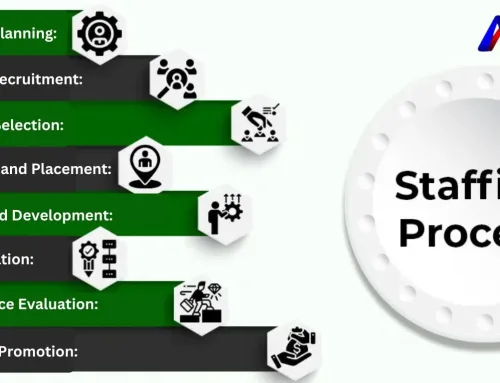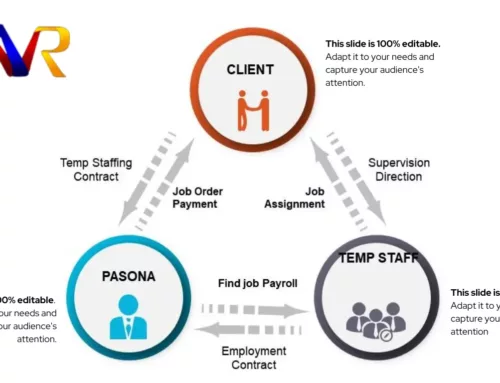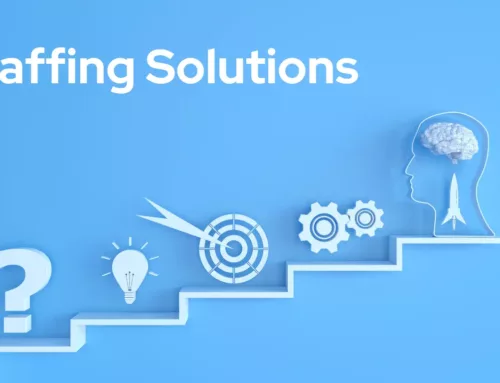Assigning the right individuals to the right jobs is what staffing is all about. Regardless of size or sector, staffing is vital for every organization. Because staffing has a direct effect on an organization’s performance and successful potential, selecting a premier recruitment firm such as MNR Solutions will help you attain business success via efficient staffing. This blog explores the meaning, functions, and importance of staffing, offering businesses and HR professionals a thorough grasp.
Staffing: Definition & Meaning
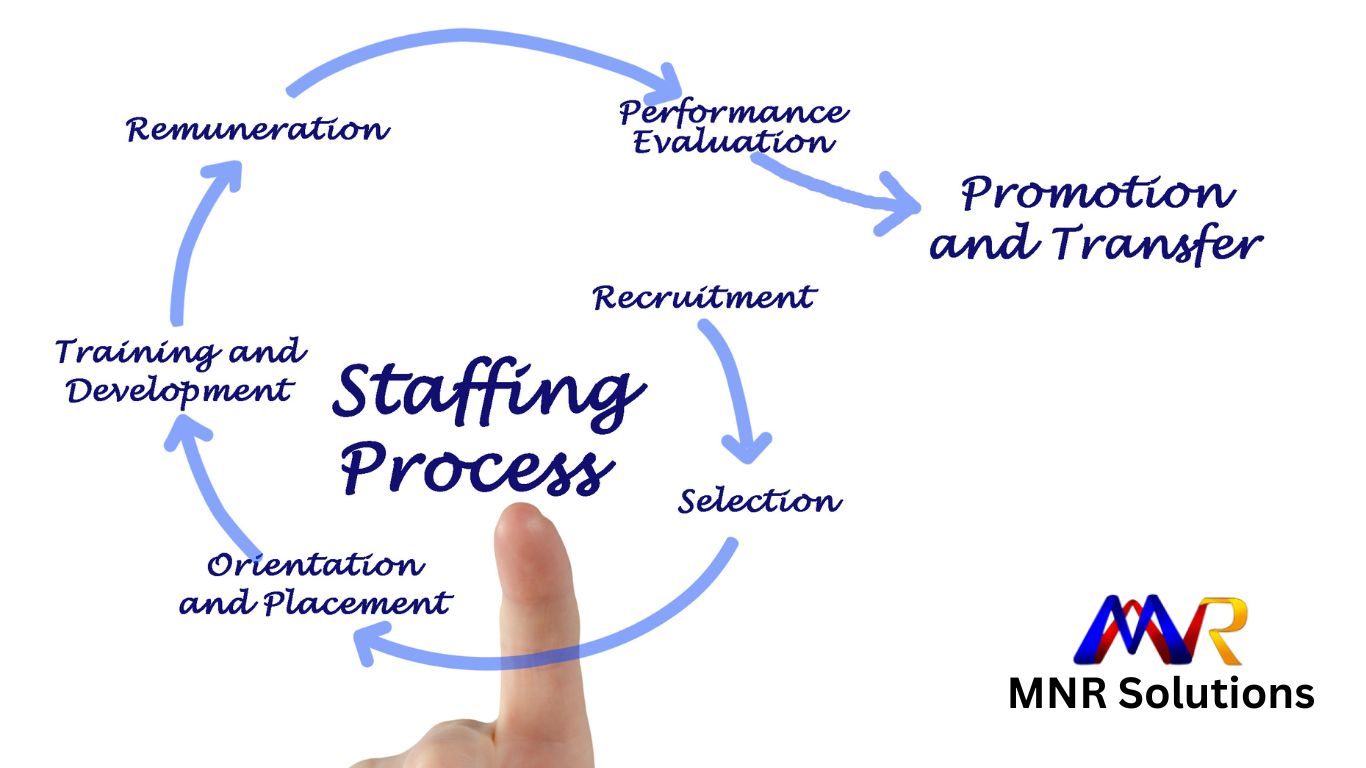
Staffing can also be explained as a process of selecting a qualified workforce for positions available in an organization. Staffing in management can be defined as the process of recruiting, selecting, and placing candidates in jobs that suit the organizational needs.
Operating the organizational structure by appropriate and efficient personnel selection, evaluation, and development to fill tasks outlined in the structure is the managerial responsibility of staffing. Finding qualified long-term candidates for the various positions within the organization is the primary objective of permanent staffing. At different stages of the staffing process, hiring might be done by contractors or by business employees. However, the whole staffing process can be easily done by a staffing service provider like MNR Solutions.
Functions of Staffing
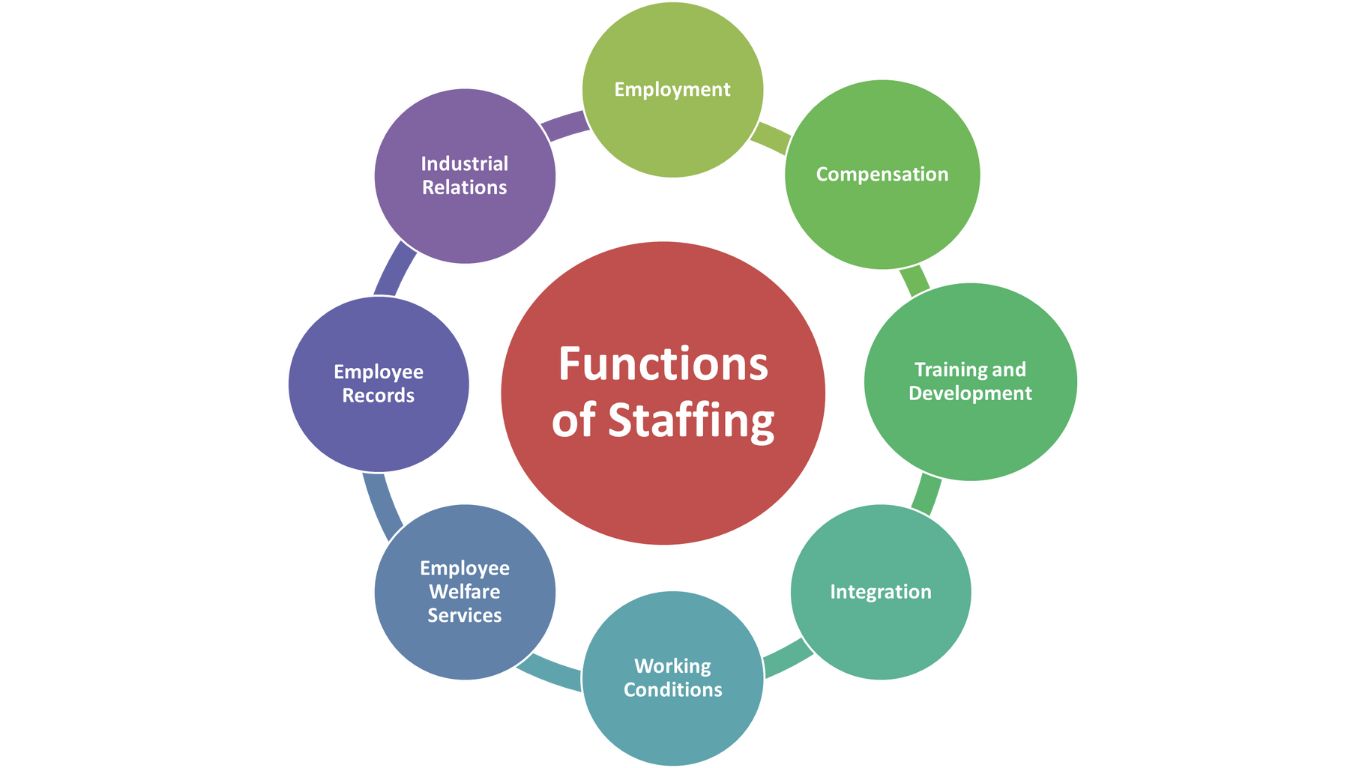
Staffing is a major part of human resource management that encompasses several basic responsibilities. These responsibilities ensure that the work personnel are qualified, motivated, and directed by the objectives of the business.
1. Planning for Manpower:
The forecasting of an organization’s future human resources needs for recruitment is referred to as workforce planning or human resource planning. This involves the assessment of the workforce at its present state, forecasting future requirements, and coming up with strategies for adding or modifying. With workforce planning and staffing solutions, a company will never have a problem of having too many employees or too few employees.
2. Hiring Process:
Recruitment is the act of sourcing, screening, and selecting people to apply for jobs in a firm. Writing job ads, posting jobs, and identifying candidates through boards, social sites, and agencies are also part of the hiring process. Thus, staffing is the process of establishing the workforce to select the most suitable candidate out of several applicants.
3. Screening the Right Candidates:
The process of selecting the best applications from the pool of candidates involves screening and making that decision. Finding the best candidate for the job entails reviewing resumes, holding interviews, and utilizing a variety of assessment instruments. Finding people with the right experience, talents, and organizational culture is yet another function of staffing.
4. Positioning the Workforce:
Placing the chosen applicant in the appropriate role is the process of placement, and it comes under the role of the staffing agency. Ensuring that an individual’s abilities and qualifications align with the work demands is a crucial procedure that enhances job engagement and productivity.
5. Education and Training:
The only method of improving professional learning and competency is through education and training. A survey by LinkedIn titled Global Talent Trends revealed that firms with elaborate staff training policies report a 34% jump in staff engagement.
Training aims to enhance the skills required for a particular position. In contrast, development prepares workers for new roles and responsibilities—programs for ongoing training and development aid in adjusting to new developments in technology and shifting consumer demands.
6. Evaluation of Performance:
The methodical assessment of workers’ performance to predetermined standards is known as performance appraisal. It gives workers feedback, points out areas in need of development, and supports decision-making on awards, raises, and professional advancement. It all comes under the responsibilities of staffing.
7. Pay and Benefits:
Paying employees the right salary and perks involves compensation. Incentives, pension plans, medical coverage, and other benefits are all included. Offering competitive pay packages is crucial for drawing in and keeping talent.
8. Staff Relation:
A pleasant workplace requires maintaining good employee interactions. To perform this duty, complaints from employees must be addressed, communication must be encouraged, and labor laws and regulations must be followed. Positive working relationships raise morale and increase output.
Also read: Benefits of On-Demand Staffing.
Importance of Staffing
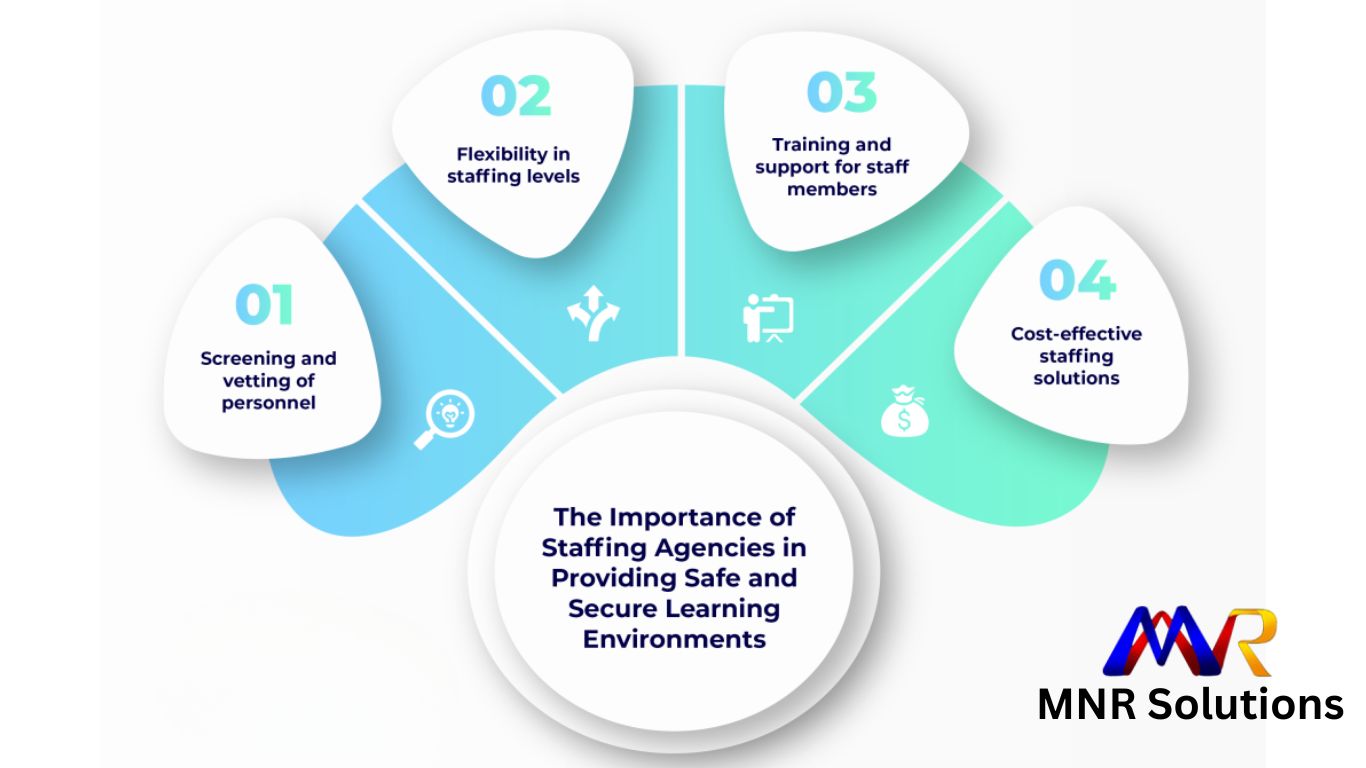
Finding people who are qualified for a particular job function is the main importance of staffing. Checking that the chosen candidates are productive enough and can boost the expansion and standing of the company is the main deal of staffing. Full-time, part-time, temporary, or long-term employment – finding a candidate is easy with staffing.
Human resource procurement is not merely the process of selecting candidates for various organizational roles but also encompasses staffing as a key managerial function. The following are the major importance of staffing:
1. Reaching Business Goals
Staffing is essential when it comes to ensuring that individuals are placed well within an organization to ensure they meet the intended goals that an organization sets. Staffing is important in organizations since it results in the improvement of performance and effectiveness among the selected persons.
2. Increasing Productivity
Timely staffing can bring in more productivity and better performance. Organizational fit implies that employees who are well suited for their roles are usually motivated and committed and perform better in those positions—consequently, the level of productivity and employment quality increases.
3. Cut Down on Turnover
Cost overruns are highly sensitive to overextension, specifically in the areas of production, development, and recruitment costs within organizations. Staffing leads to a reduction in turnover since it means that employees take their positions happily, and there are chances for them to be promoted.
4. Creating a Successful Workplace
Staffing also determines the profitability of the firm since hiring the right people will enhance productivity in the organization. Overall worker satisfaction and increased productivity result when a worker has interests and aptitudes similar to the required job tasks. This helps cultivate a friendly environment at the workplace.
5. Adjusting to Modest Changes
Employing future-focused methods is essential for businesses to adjust to change. Proper staffing services guarantee that the labor force is adaptable and equipped to tackle novel obstacles stemming from internal alterations, market fluctuations, or technological breakthroughs.
6. Creating a Reasonable Lineup
The most precious asset of a company is its people. A competitive edge can be developed through effective personnel, which draws and keeps top talent. Productive and driven staff members stimulate creativity, raise client happiness, and boost the company’s overall performance.
Covering All
As per the report of the Society for Human Resource Management (SHRM), a bad hire typically costs five times the employee’s yearly compensation. This covers expenses for hiring, onboarding, orientation, and productivity loss. Thus, prioritizing the importance of staffing is a strategic requirement that cannot be disregarded for companies hoping to succeed in a cutthroat market. Having the right people in place allows an organization to run smoothly and adjust to changes in the marketplace. And this is possible when you’re hiring MNR Solutions as your staffing partner.


